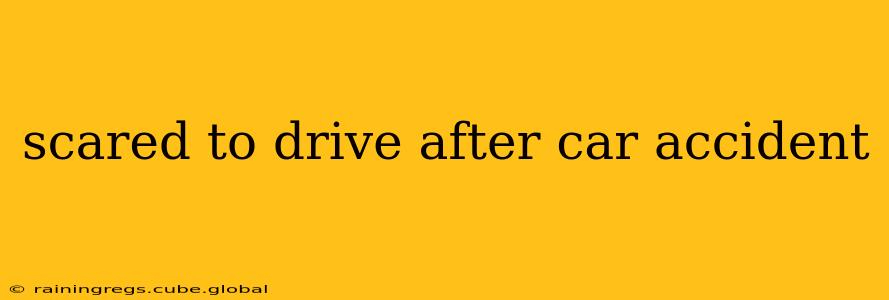Experiencing a car accident can be a profoundly traumatic event, leaving lasting emotional and psychological impacts. For many, the fear of getting back behind the wheel after an accident is a significant hurdle in the recovery process. This isn't simply a matter of overcoming a momentary fear; it's a complex issue that requires understanding, patience, and potentially professional help. This comprehensive guide explores the common anxieties surrounding post-accident driving and offers practical strategies for regaining confidence and control on the road.
Why Am I Scared to Drive After a Car Accident?
The fear of driving after an accident is completely understandable. The accident itself likely triggered a strong emotional response, possibly including:
- Trauma: The accident may have resulted in physical injuries, emotional distress, or both. The experience can leave lasting psychological scars, including post-traumatic stress disorder (PTSD).
- Loss of Control: A core fear in many people is the loss of control. The accident likely felt like a situation where you were powerless, leading to anxiety about regaining control while driving.
- Physical Symptoms: Even without serious injuries, you might experience physical symptoms like muscle tension, increased heart rate, or shortness of breath when thinking about driving. These physical reactions reinforce the fear.
- Fear of Re-Injury: A rational fear is the concern of being involved in another accident, potentially leading to further injury.
- Flashbacks and Nightmares: Recurring memories or nightmares of the accident can make the thought of driving extremely distressing.
What are the Signs of Post-Accident Driving Anxiety?
Recognizing the signs of post-accident driving anxiety is the first step towards recovery. These signs can manifest in various ways:
- Avoidance: Actively avoiding situations that require driving, even for essential errands.
- Physical Symptoms: Experiencing physical symptoms like sweating, shaking, or rapid heartbeat when thinking about driving.
- Emotional Distress: Feeling anxious, overwhelmed, or panicked at the thought of getting behind the wheel.
- Changes in Driving Habits: Driving more cautiously than before, even to the point of being overly cautious and impacting other drivers.
- Difficulty Concentrating: Finding it hard to focus while driving, even on familiar routes.
How Can I Get Over My Fear of Driving After an Accident?
Overcoming post-accident driving anxiety is a process that requires time and patience. There's no quick fix, but these strategies can significantly help:
- Professional Help: Seeking therapy from a psychologist or counselor specializing in trauma can provide effective tools and strategies for managing anxiety and PTSD. Cognitive Behavioral Therapy (CBT) is particularly useful for addressing these concerns.
- Gradual Exposure: Start with short driving sessions in low-traffic areas, gradually increasing the distance and complexity of your routes.
- Supportive Driver: Having a trusted friend or family member accompany you during your initial driving sessions can provide comfort and support.
- Driving Lessons: Consider refresher driving lessons from a qualified instructor who can help you regain confidence and address any specific driving concerns.
- Relaxation Techniques: Practicing relaxation techniques such as deep breathing exercises, meditation, or yoga can help manage anxiety symptoms.
- Self-Care: Prioritize self-care activities such as getting enough sleep, eating healthy, and engaging in regular exercise to support your mental and physical well-being.
How Long Does It Take to Get Over the Fear of Driving After an Accident?
The time it takes to overcome post-accident driving anxiety varies greatly depending on the severity of the accident, the individual's coping mechanisms, and the support they receive. Some individuals might recover within a few weeks, while others may require months or even longer. It's essential to be patient with yourself and celebrate small victories along the way. Don't hesitate to seek professional help if you're struggling to overcome your fear.
Can Medication Help with Post-Accident Driving Anxiety?
In some cases, medication might be helpful in managing the symptoms of post-accident driving anxiety, particularly if PTSD is involved. However, medication should always be prescribed and monitored by a qualified healthcare professional. They can determine if medication is necessary and what type would be most appropriate. It's crucial to remember that medication is often most effective when used in conjunction with therapy.
What if I'm Still Scared to Drive Even After Therapy?
If you've completed therapy and still experience significant driving anxiety, don't lose hope. It's important to continue practicing gradual exposure techniques and seeking additional support if needed. You might consider working with a driving rehabilitation specialist who can tailor a program to your specific needs and anxieties. Remember that recovery is a journey, and setbacks are normal.
This journey back to driving confidence requires self-compassion and a realistic approach. Prioritize your well-being, seek support when needed, and celebrate each step forward. You are not alone, and with consistent effort and the right support, you can regain your confidence behind the wheel.
